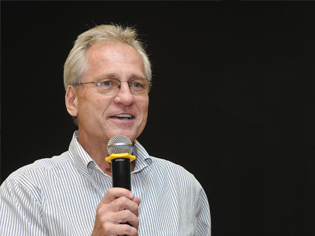Young Children’s Voices in Mathematical Problem Solving
Contributed by Dr Ho Siew Yin and Sng Wei Qin Abbie, from NTUC First Campus, for SingTeach Virtual […]
Read More
Thinking about learning and teaching has evolved over the years. Today, we think of students as agents of their own learning. Professor Scott Paris tells us why it is important to cultivate engaged and motivated learners.
 A: In traditional notions, teaching was delivered by instructors and learning was acquired by students. More people now recognize that students’ internal motivation and intrinsic knowledge of the topic is very critical for deep learning.
A: In traditional notions, teaching was delivered by instructors and learning was acquired by students. More people now recognize that students’ internal motivation and intrinsic knowledge of the topic is very critical for deep learning.
There are two important features. One is the notion of agency – that students see themselves as agents of their own learning. Their self-beliefs are important.
Students’ understanding of their own roles as confident agents shaping their own learning, in directing their own effort and repairing their own problems, is critical so that they don’t depend on teachers to tell them what to do. They don’t depend on external motivation like marks and rewards to learn.
The other is the sense of identity. As they begin to identify themselves as competent and successful learners, it helps them exert appropriate effort. It also helps them create distinctive perceptions of their own competence in different areas.
A: We are asking teachers to pay attention to students’ views about themselves, about what they are interested in, about what they think they are good at. As teachers understand students’ notions of their agency and identities, this will help them understand how students adopt different coping strategies.
Particularly with the failing students, they often have negative ideas of their own abilities or identities. These negative attitudes can actually make students stop trying and yield to a self-defeating approach to education.
A: If you give students opportunities to be independent, to be engaged, to pursue their own interests, then they will be more motivated. Some people call it autonomous learning or self-regulated learning.
– Scott Paris, Centre for Research in Pedagogy and Practice
As students develop an interest in an area, the most important thing is to give them freedom to explore it. Teachers can do that by allowing opportunities in the classroom for independent research – allow them to explore their own interest, develop deeper knowledge, and really give them the independence to seek that.
When students have the ability to do that, we find they persist longer in the face of difficulties. They show more initiative and curiosity, and develop a greater sense of confidence in their ability.
So the self-efficacy of learning and discovering reinforces their motivation to learn because it shows that their efforts are successful. This cycle of effort is what teachers need to create so that students feel confident.
A: It is understanding that you can do something and also that you should do something. It is not just the confidence that you can do it but also the knowledge that you ought to do it and of what you need to do.
The feeling of self-efficacy motivates people. If you think about what you are good at, you have the sense that I know how to tackle this problem, I know the different strategies that are available, and I can figure out which ones are appropriate.
That is the kind of feeling you want your students to have when you give them a new or an ill-structured problem. They approach it with the attitude that they have the tools and strategies to solve the problem and that they can do it.
A: All of us need to acquire the same kind of independence and self-regulation. It is hard for teachers because they have so many constraints and so many things to do. Like students, they are often driven by instrumental motivation.
– Scott on how teachers can be more motivated
We need to give teachers opportunities for reflection and professional development, so they recognize that they need to direct their own motivation. They need to be selective, set priorities, manage their time, choose goals that are important for their students.
Teachers who have a sense of self-efficacy know they can’t do everything, so they plan things throughout the year. They plan different things for different students. And as teachers become more expert at knowing how to adjust to different situations, they gain a sense of self-confidence.
It is professionally motivating for them to work together as a community and share the secrets of how they all become successful – different techniques for teaching, different opportunities for stimulating students’ interest, sharing the things that work for them.
As you gain this sense of self-efficacy, you have a growing sense of agency and identity, so that you feel I can do this and I can learn what I need to learn. When you have that as a teacher or as a student, you are confident you can accept new challenges.